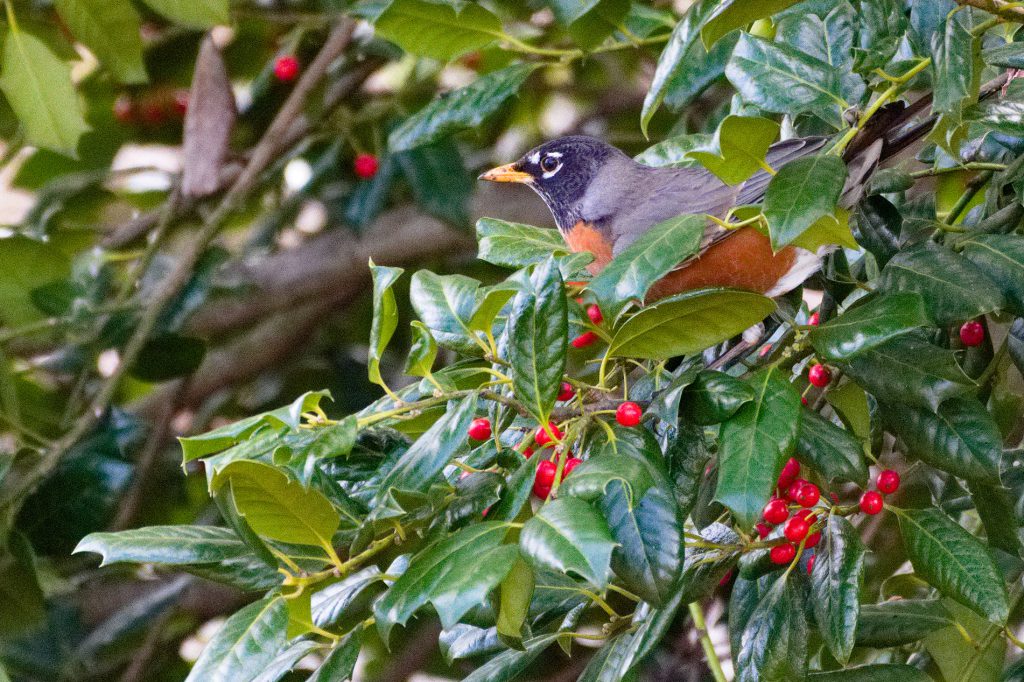
BCDC proudly supports the long-running (100+ years) Delaware County/Glenolden Christmas Bird Count (CBC), held annually on the first Saturday of the count period of December 14 to January 5. The CBC encompasses much of Delaware County, from the Delaware River to Newtown Square, Yeadon to Garnet Valley. Hotspots and pocket parks are scoured for birds during the count, including John Heinz National Wildlife Refuge, Ridley Creek State Park, Tyler Arboretum, Springton and Crum Creek Reservoirs, Hildacy Preserve, The Willows, Hog Island Road and the Delaware River, and more. Each year on the designated date, teams of birders fan out across the 15-mile diameter circle to count every bird species and individuals that they can find, from owls, eagles, hawks, and ducks, to woodpeckers, waders, blackbirds, and more.
The 2023 Delaware County/Glenolden CBC was held on Saturday, December 16, 2023. This expansive community-science event reflected ongoing enthusiasm and support from BCDC and the local birding community. Note highlights below excerpted from the compiler’s report.
- 99 species were tallied; the 10-year average is 91 species (the record was 117 species in 1978);
- 99 people participated; the record was 121 participants in 1982;
- Ash-throated Flycatcher was a brand-new addition to the CBC; Nashville Warbler was only the 2nd-ever record. Both species were found at John Heinz National Wildlife Refuge.
- Notable species include Common Gallinule, Horned Grebe, Barred Owl, American Wigeon, Eastern Phoebe, and Orange-crowned, Pine and Palm Warblers; these are reported on less than half of the last 15 CBC’s.
- Several species set high-count records, including: Red-shouldered Hawk (31), Yellow-bellied Sapsucker (48), Hairy Woodpecker (83), Pileated Woodpecker (27), Fish Crow (637), Common Raven (13), Ruby-crowned Kinglet (46), Hermit Thrush (36).
Rich Horwitz served as the 2023 Compiler, taking the reigns from Dave Eberly who stepped down from the role after the December 2022 CBC. BCDC hosted a post-count social at Stinger’s waterfront restaurant, Ridley Park, where CBC’ers gathered to share snacks, beverages, and highlights of a day in the field counting birds.
Many thanks to Rich Horwitz, and all the section leaders and volunteers who came out to count birds for conservation! Check-out the eBird CBC trip reports and Compiler reports below.
2023 Delaware County/Glenolden CBC eBird Trip Report
2022 Delaware County/Glenolden CBC eBird Trip Report
2021 Delaware County/Glenolden CBC eBird Trip Report
The first-ever Christmas Bird Count took place in 1900, when ornithologist Frank Chapman rallied friends to count birds. He was encouraging an alternative to the holiday tradition of shooting birds on Christmas Day – unfortunately mostly for sport, not food – resulting in thousands of birds lost on a single day of the year. In the late 1800s, birds were already declining at alarming rates, although conservation was hardly a concept at the time.
Today, Audubon, in partnership with Cornell Lab of Ornithology and other organizations, mobilizes thousands of volunteers to participate in CBCs across the country, contributing important community science data that informs conservation decisions at every level. Rachel Carson, in penning her powerful book, Silent Spring, referenced data from the CBC to show the decline of birds due to widespread use of the pesticide DDT; her book convinced Congress to enact the Endangered Species Act in 1972, one of the most powerful conservation legislations in effect.
Rich Horwitz serves as the Glenolden CBC Compiler 2023 – present (participant since 1987).
Dave Eberly served as Glenolden CBC Compiler 2009-2022 (participant since 1983).
Nick Pulcinella served as Glenolden CBC Compiler 1991-2008 (participant since 1969).
Former Glenolden CBC Compilers: John Gillespie (1922-1948), Ted Rigby (1949-1974), Keith Richards (1975-1979), Frank Haas (1980-1988), Walter Thurber (1989-1990).
The articles below about early Glenolden CBCs highlight fascinating contrasts in volunteer effort and bird species over time – imagine finding Barn Owls and Rough-legged Hawks, but no Red-bellied Woodpeckers or Black Vultures!
